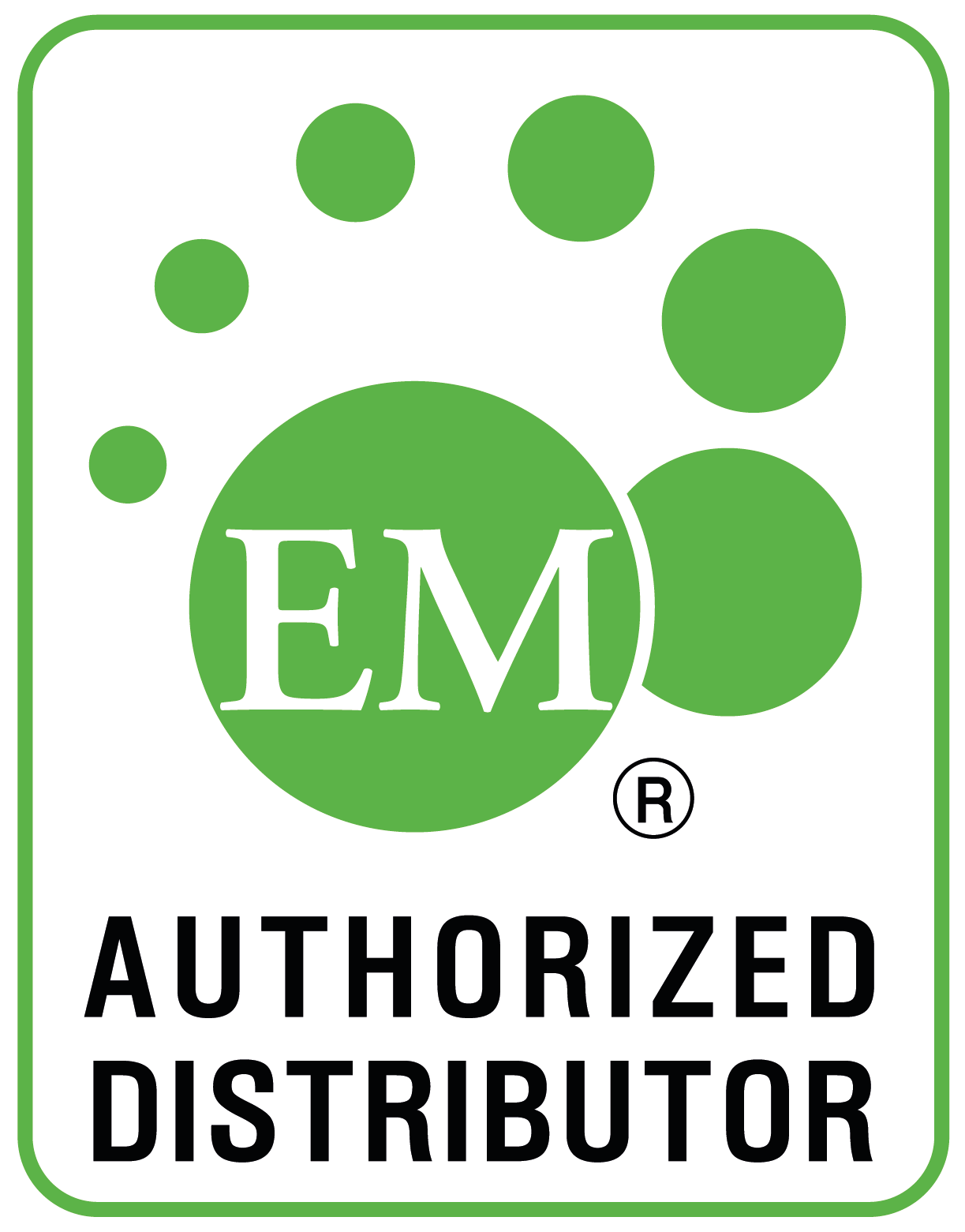
NATURALLY HEALTHY
microorganisms
Our naturally fermented equine products, enriched with Effective Microorganisms (EM®) and bioactive substances, help your horse shine from the inside out. Designed to support gut health, skin, fur, hooves, and the stable environment, our holistic range works in harmony to promote a healthy, balanced ecosystem for your horse.
Safe to use together with feed and other supplements, these products prevent common health issues and enhance well-being naturally. By fostering biological diversity and introducing beneficial microorganisms, we strengthen immunity and contribute to your horse’s physical and mental health - all while supporting sustainable, regenerative practices.
Supporting gut health
Owning a horse can be overwhelming, with questions about care, feeding, and maintenance. That’s why our Equine range is designed to simplify the process by combining natural solutions with scientific backing.
From volcanic rock dust for bedding to clay minerals for feed and Effective Microorganisms (EM) for washing or water, we turn to nature for answers. Our range includes Proferm, a fermented feed supplement rich in probiotics to support gut health, and Syn Vital, a prebiotic fibre blend that promotes digestion and nutrient absorption. Together, they help maintain a balanced and healthy digestive system.
EM forms the core of many of our products, creating healthier environments for your horse in the stable, paddock, and beyond. Passionate about horses, we’re here to help - reach out to our experts or explore more below!
Proferm, Syn-Vital
Syn-Vital and Proferm support the digestive tract of the horse to enhance nutrient absorption and improve the overall health of the horse.
Pre and probiotics for the intestinal flora.
Mix with standard horse feeds to restore intestinal flora and improve the general condition and immunity of your animals.
Proferm is a feed additive produced through a fermentative process with Effective Micro-organisms (EM®) and spelt bran.
Syn-Vital is a feed additive made the same way using wheat bran. Both support intestinal tract and fibre digestion. This results in improved digestion and uptake of nutrients which then leads to a reduction in fodder costs. Particularly important when the horse is experiencing a change of diet.
-
Prebiotics serve as a vital form of dietary fibre that fosters the growth and activity of beneficial bacteria within your horse's stomach and intestines. By serving as nourishment for these beneficial bacteria, prebiotics play a crucial role in maintaining a balanced gastrointestinal tract. When these beneficial bacteria are adequately nourished, they flourish, effectively inhibiting the proliferation of harmful bacteria.
Administering prebiotics to your horse offers several benefits for their digestive health:
Enhanced Nutrient Absorption: Prebiotics can optimize the absorption of nutrients within your horse's digestive system, ensuring that your horse obtains maximal nutrition from its diet.
Reinforced Immune System: By fostering the production of short-chain fatty acids in the gut, prebiotics bolster your horse's immune system. This bolstered immunity can exert an anti-inflammatory effect and heighten your horse's resilience against illnesses.
Mitigation of Gastrointestinal Issues: Maintaining a healthy intestinal flora through prebiotics diminishes the likelihood of encountering gastrointestinal problems such as colic, diarrhea, and constipation.
While prebiotics naturally occur in foods like root vegetables, vegetables, and fruits, specialized prebiotic supplements tailored for horses are also available in the market. It is imperative to administer prebiotics to your horse in appropriate quantities within a balanced diet to effectively nurture a healthy gastrointestinal tract.
-
Probiotics offer numerous advantages for horses in various circumstances, including:
Post-Antibiotic Treatment: Following antibiotic therapy, which disrupts the natural microbial equilibrium in the horse's intestines, probiotics aid in restoring this balance and facilitating recovery.
Stressful Situations and Travel: Stress and travel can negatively impact the horse's digestive system. Probiotics contribute to strengthening the immune system and mitigating the risk of digestive issues during such periods.
Feed Transitions: Changes in feed or transitioning from pasture to stable living can upset the balance of intestinal flora. Probiotics help minimize the risk of digestive disturbances and diarrhoea during these transitions.
Diarrhoea and Colic Management: Probiotics play a role in alleviating symptoms associated with diarrhoea and colic, promoting swifter recovery.
Mood Imbalance: An unbalanced internal environment in horses can lead to mood changes, similar to humans. Probiotics aid in restoring equilibrium in such cases.
Hoof and Skin Conditions: Microbial imbalances within the horse's system can affect the health of the skin and hooves. Probiotics help maintain balance, reducing the susceptibility of the skin to issues like fungal infections, eczema, and sun damage, while also fortifying hooves against diseases and stressors.
It's crucial to recognize that probiotics should complement rather than replace medical treatment. Consulting a veterinarian is always advisable to determine the appropriateness of probiotics for your horse's specific needs.
-
Here are some effective strategies:
Proper Feeding: Ensure your horse receives a diet rich in high-fibre roughage like hay and grass, which aligns with their natural digestive system. Limit grain-based feed and pasture intake. Providing access to fresh water at all times is essential.
Outdoor Grazing: Allow your horse to graze outdoors whenever possible, as natural grazing aids in maintaining balanced intestinal flora. However, be mindful of the sugar and starch content in the pasture.
Stress Reduction: Minimize stressors in your horse's life by providing adequate space, opportunities for social interaction with other horses, and avoiding overtraining. Stress can adversely affect the gastrointestinal tract.
Probiotic Supplements: Incorporate probiotics into your horse's diet to support the growth of beneficial bacteria in the stomach and intestines, thus reducing the risk of gastrointestinal issues.
Regular Exercise: Engage your horse in regular exercise to promote healthy digestion and prevent gastrointestinal problems.
Veterinary Care: Schedule routine veterinary check-ups to detect any health issues early on, helping to prevent minor problems from escalating into serious conditions.
Observation of Symptoms: Be vigilant for any signs of gastrointestinal distress such as diarrhoea, constipation, weight loss, or decreased appetite. Promptly consult a veterinarian if you observe any concerning symptoms.
By attentively managing your horse's diet, exercise regimen, and overall health, you can significantly contribute to maintaining a harmonious balance in their stomach and intestines.
-
If your horse is experiencing diarrhoea, swift action is crucial to prevent dehydration and further complications. Here's what you can do to assist your horse:
Ensure Ample Water Supply: Diarrhoea can lead to dehydration, so it's essential to ensure your horse has constant access to fresh water. Consider supplementing with electrolyte solutions to restore fluid balance.
Adjust Diet: Modify your horse's diet by reducing the intake of roughage and concentrates. Offer small, frequent meals to ease the digestive load. Additionally, consider incorporating supplements specifically formulated to support gastrointestinal health.
Consider Probiotics: Introduce probiotics to help replenish beneficial gut bacteria and restore balance in the gastrointestinal tract.
Seek Veterinary Assistance: If diarrhoea persists for more than a couple of days or if your horse exhibits accompanying symptoms such as fever, weakness, or decreased appetite, promptly consult a veterinarian. Your vet can provide guidance on managing your horse's condition and determine if medical intervention is necessary.
Remember, diarrhoea could indicate an underlying health issue, so it's crucial to seek professional veterinary care for proper diagnosis and treatment.







